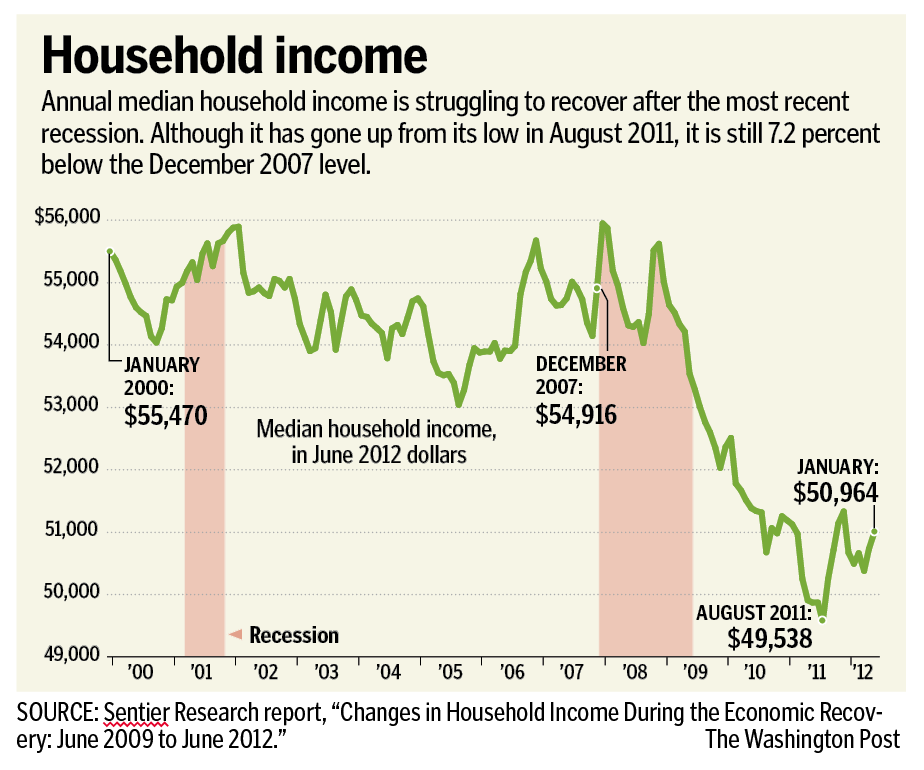WASHINGTON — Household income is down sharply since the recession ended three years ago, according to a report released Thursday, in another sign of the stubborn weakness of the economic recovery.
From June 2009 to June 2012, inflation-adjusted median household income fell 4.8 percent to $50,964, according to a report by Sentier Research, a firm headed by two former Census Bureau executives.
Incomes have dropped more since the beginning of the recovery than they did during the recession itself, when they declined 2.6 percent, according to the report, which analyzed data from the Census Bureau’s
Current Population Survey. The recession, the most severe since the Great Depression, lasted from December 2007 to June 2009.
Overall, median income is 7.2 percent below its December 2007 level and 8.1 percent below where it stood in January 2000, which was at $55,470, according to the report.
The findings highlight the depth of the recession and the long road the nation has to traverse before it fully recovers. They also echo other reports detailing the financial carnage caused by recession.
This summer, the Federal Reserve reported that the downturn eviscerated two decades of Americans’ wealth. The central bank said the median net worth of families plunged by 39 percent in just three years, from $126,400 in 2007 to $77,300 in 2010, pushing that measure back to nearly 1992 levels.
Few analysts expect a quick bounce back even as the economy grows, if tepidly. The unemployment rate was 8.3 percent in July, marking 42 months that it has been above 8 percent. About 5.2 million people — 40 percent of the unemployed — had been out of work for more than six months. Another 8.2 million were working part time because they could not get full-time work.
Corporate profits have recovered. But with workers producing more on the job, the gains in economic output have not been matched by new hiring.
“The character of the recovery has been one that has benefited businesses more than it has workers,” said Gary Burtless, a Brookings Institution economist.
Although the new report does not take into account tax cuts enacted in recent years that have boosted take-home pay, it shows that a broad swath of Americans have lost some income.
Over the past three years, the inflation-adjusted median income of households headed by whites was down 5.2 percent to $56,255. Households headed by blacks sustained a staggering 11.1 percent drop in median income. Hispanic-led households saw their real income decline by 4.1 percent over the same period, the report said.
Looking at the data by age, the researchers found that income has risen only for workers older than 65 during the recovery, which report co-author and Sentier partner Gordon Green attribute to the cost-of-living increases for Social Security recipients.
Households led by the self-employed saw their income drop 9.4 percent to $66,752, the report said. Households headed by private-sector employees saw wages drop by 4.5 percent to $63,800, and households led by government workers saw median income decline by 3.5 percent to $77,998, the report said.
Government workers, on average, are better educated than private-sector workers, which could help explain their higher wage levels, Green said.
The report also concluded that the declines have been most dramatic in the West, where household income is down 8.5 percent over the past three years. By comparison, income was down 4.9 percent in both the Northeast and the South, the report said, while the Midwest saw incomes drop by just 1.1 percent over the past three years.



